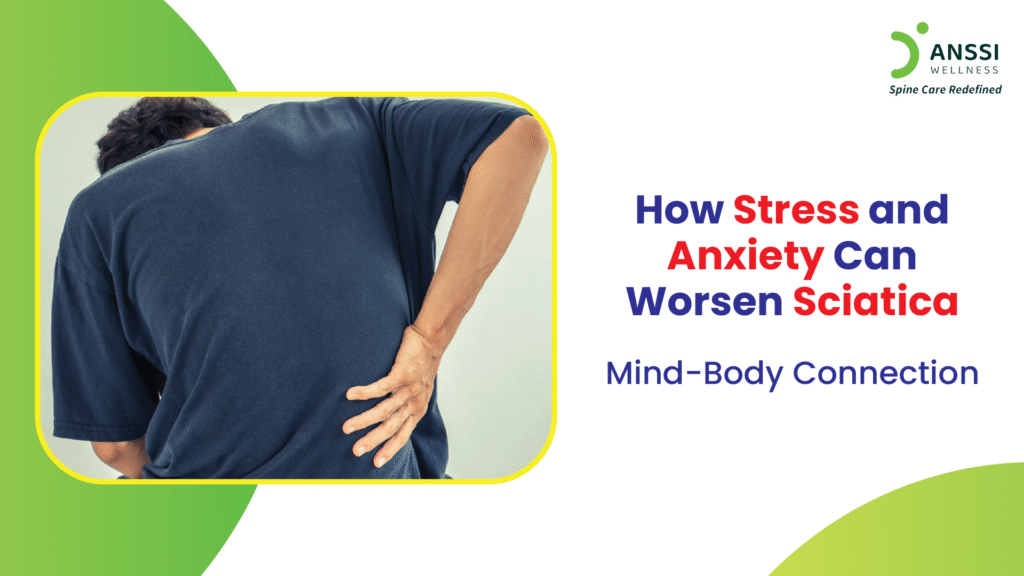Sciatica is a common condition where pain radiates from the lower back down through the buttocks and legs, caused by irritation or compression of the sciatic nerve. While most people associate sciatica with physical causes such as a herniated disc or spinal stenosis, there’s another powerful factor that often gets overlooked – the role of stress and anxiety.
How Stress and Anxiety Affect Sciatica
The human body and mind are deeply connected. Stress and anxiety not only affect our emotional state but also have a profound impact on physical pain. For someone suffering from sciatica, unmanaged mental stress can make symptoms significantly worse.
1. Muscle Tension
When you’re stressed, your muscles naturally tighten. This is part of the body’s “fight or flight” response. Unfortunately, tight muscles in the lower back, hips, and buttocks can increase pressure on the sciatic nerve, intensifying pain and discomfort.
2. Increased Inflammation
Chronic stress triggers elevated cortisol levels. While cortisol is meant to help in short bursts, prolonged high levels cause inflammation, which can irritate the already sensitive sciatic nerve.
3. Heightened Pain Sensitivity
Anxiety changes how the brain processes pain signals. When you’re anxious, the nervous system becomes hyper-alert, making even mild discomfort feel severe.
4. Reduced Healing
Stress impacts circulation, oxygen delivery, and nutrient supply to tissues. This slows the body’s natural healing process, meaning sciatica may take longer to improve.
The Vicious Cycle of Pain and Stress
Sciatica can be both a cause and a result of stress. Pain limits movement, which may lead to frustration, anxiety, and even depression. These mental health challenges further worsen muscle tension, inflammation, and nerve sensitivity.
Poor sleep is another major factor in this cycle. Anxiety and discomfort make it difficult to get restorative rest. Without proper sleep, the body struggles to repair damaged tissues, and pain thresholds decrease, making symptoms even more unbearable.
Ways to Counter Stress and Anxiety for Sciatica Relief
Breaking the stress-pain cycle is essential for recovery. Here are some effective strategies:
1. Practise Mindfulness and Deep Breathing
Mindfulness meditation helps calm the mind, reduce muscle tension, and regulate breathing. Deep breathing exercises can also reduce stress hormones and improve oxygen flow to tense muscles.
2. Gentle Yoga and Stretching
Certain yoga poses and targeted stretches can help release muscle tension in the lower back and hips. They also encourage relaxation, which reduces both physical and mental stress.
3. Maintain a Consistent Sleep Routine
Prioritise 7-8 hours of quality sleep. Create a relaxing bedtime environment, avoid caffeine in the evening, and practise relaxation techniques before bed.
4. Seek Professional Support
If stress or anxiety feels overwhelming, consider speaking with a counselor, psychologist, or therapist. Cognitive Behavioural Therapy (CBT) is especially effective for breaking the pain-stress loop.
Non-Surgical Treatments for Sciatica
While addressing mental well-being is vital, physical treatment for sciatica is equally important. For many patients, non-surgical solutions offer effective relief without the risks of surgery.
- Non-Surgical Spinal Decompression Treatment: A gentle, USA protocol-based treatment that reduces pressure on the sciatic nerve, promoting healing of the discs.
- Physiotherapy: Helps improve mobility, strengthen supporting muscles, and correct posture.
- Lifestyle Adjustments: Ergonomic seating, regular movement breaks, and proper lifting techniques can help prevent flare-ups.
Combining these treatments with stress management strategies offers the best chance for long-term recovery.
About ANSSI:
ANSSI Wellness focuses on improving the quality of life for patients suffering from spinal issues, aiming to provide relief where other conventional treatments have failed. Through advanced Non-Surgical Spinal Decompression Treatment, ANSSI is committed to helping patients avoid surgery and recover in a safe, effective, and compassionate environment.
Connect with ANSSI Wellness on LinkedIn, Instagram, and Facebook for expert guidance.




